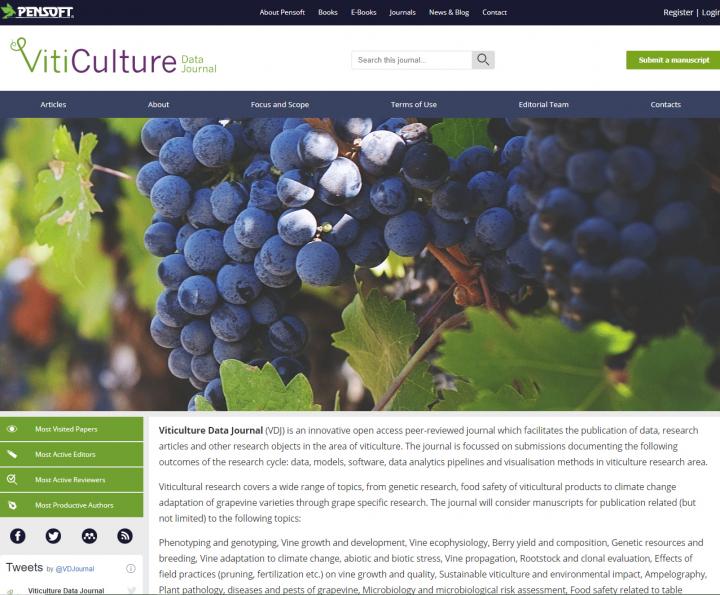
Credit: Viticulture Data Journal and ARPHA Platform
Non-conventional, yet pivotal research results: data, models, methods, software, data analytics pipelines and visualisation methods, related to the field of viticulture, find a place in a newly launched, open-access and peer-reviewed Viticulture Data Journal (VDJ). The journal went live with the publication of an introductory editorial and a data paper.
The publishing venue is one of the fruits borne during the collaboration between scholarly publisher and technology provider Pensoft, its self-developed ARPHA Platform and the EU project AGINFRA+, whose mission is to provide a sustainable channel and data infrastructure for the use of cooperating, but not fully connected user communities working within the agricultural and food sciences.
The novel journal brings together a wide range of topics related to the field of viticulture: from genetic research, food safety of viticultural products to climate change adaptation of grapevine varieties through grape specific research. Amongst these are:
- Phenotyping and genotyping
- Vine growth and development
- Vine ecophysiology
- Berry yield and composition
- Genetic resources and breeding
- Vine adaptation to climate change, abiotic and biotic stress
- Vine propagation
- Rootstock and clonal evaluation
- Effects of field practices (pruning, fertilization etc.) on vine growth and quality
- Sustainable viticulture and environmental impact
- Ampelography
- Plant pathology, diseases and pests of grapevine
- Microbiology and microbiological risk assessment
- Food safety related to table grapes, raisins, wine, etc.
With the help of the ARPHA Platform’s signature writing tool, authors are able to use a set of pre-defined, yet flexible manuscript templates: Data Paper, Methods, Emerging Techniques, Applied Study, Software Description, R Package and Commentary. Furthermore, thanks to the advanced collaborative virtual environment provided by the tool, authors, but also reviewers, editors and other invited contributors enjoy the convenience of working within the same consolidated online file all the way from the authoring and peer review stages to copy editing and publication.
“The Viticulture Data Journal was created to respond to the major technological and sociological changes that have influenced the entire process of scholarly communication towards Open Science,” explain the editors.
“The act of scientific publishing is actually the moment when the long effort of researchers comes to light and can be assessed and used by other researchers and the wider public. Therefore, it is little wonder that the main arena of transition from Open Access to Open Science was actually the field of academic publishing,” they add.
The first research publication made available in VDJ is a data paper by the research team from Agricultural University of Athens: Dr Katerina Biniari, Ioannis Daskalakis, Despoina Bouza and Dr Maritina Stavrakaki. In their study, they assess and compare both the qualitative and quantitative characters of the grape cultivars ‘Mavrodafni’ and ‘Renio’, grown in different regions of the Protected Designation of Origin Mavrodafni Patras (Greece). The associated dataset, containing the mechanical properties, the polyphenolic content and the antioxidant capacity of skin extracts and must of berries of the two cultivars, is available to download as supplementary material from the article.
During the AGINFRA+ project, ARPHA has been extended to be used from the AGINFRA+ Virtual Research Environment (VRE), which would allow the authors to use the VRE as an additional gate to the AWT and the journal, as well as to benefit from the integration of AWT with several other services offered by the AGINFRA+ platform. The AGINFRA+ platform has been designed as a Gateway providing online access through a one-stop endpoint to services, aiming at the integration of the traditional narrative of research articles with their underlying data, software code and workflows.
###
Viticulture Data Journal is indexed by Altmetric, CrossRef, Dimensions, EBSCOhost, Google Scholar, Mendeley, Microsoft Academic, Naviga (Suweco), OCLC WorldCat, OpenAIRE, OpenCitations, ReadCube, Ulrichsweb™, Unpaywall; and archived at CLOCKSS and Zenodo
Follow Viticulture Data Journal on Twitter and Facebook.
Additional information:
About AGINFRA+
AGINFRA+ aims to exploit core e-infrastructures such as EGI.eu, OpenAIRE, EUDAT and D4Science, towards the evolution of theAGINFRA data infrastructure, so as to provide a sustainable channel addressing adjacent but not fully connected user communities around Agriculture and Food.
To this end, the project will develop and provide the necessary specifications and components for allowing the rapid and intuitive development of variegating data analysis workflows, where the functionalities for data storage and indexing, algorithm execution, results visualization and deployment are provided by specialized services utilizing cloud based infrastructure(s). Furthermore, AGINFRA+ aspires to establish a framework facilitating the transparent documentation and exploitation and publication of research assets (datasets, mathematical models, software components results and publications) within AGINFRA, in order to enable their reuse and repurposing from the wider research community.
About ARPHA:
ARPHA is the first end-to-end, narrative – and data-integrated publishing solution that supports the full life cycle of a manuscript, from authoring to reviewing, publishing and dissemination. ARPHA provides accomplished and streamlined production workflows that can be customized according to the journal’s needs. The platform enables a variety of publishing models through a number of options for branding, production and revenue models to choose from.
About Pensoft:
Pensoft is an independent academic publishing company, well-known worldwide for its innovations in the field of semantic publishing, as well as for its cutting-edge publishing tools and workflows. In 2013, Pensoft launched the first ever end to end XML-based authoring, reviewing and publishing workflow, as demonstrated by the Pensoft Writing Tool (PWT) and the Biodiversity Data Journal (BDJ), now upgraded to the ARPHA Publishing Platform. Flagship titles include: Research Ideas and Outcomes (RIO), One Ecosystem, ZooKeys, Biodiversity Data Journal, PhytoKeys, MycoKeys and many more.
Contacts:
Prof. Lyubomir Penev
Email: [email protected]
Dr Katerina Biniari
Email: [email protected]
Media Contact
Lyubomir Penev
[email protected]




